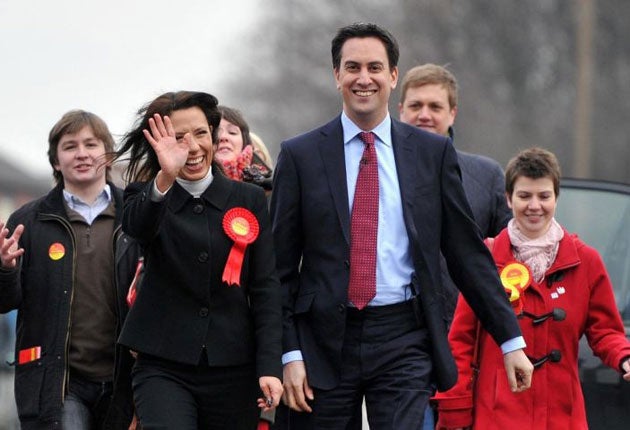Miliband: the fightback begins
Labour leader warns of 'lost generation' of jobless young Britons as Tessa Jowell declares party's priority is to reconnect with voters

Your support helps us to tell the story
From reproductive rights to climate change to Big Tech, The Independent is on the ground when the story is developing. Whether it's investigating the financials of Elon Musk's pro-Trump PAC or producing our latest documentary, 'The A Word', which shines a light on the American women fighting for reproductive rights, we know how important it is to parse out the facts from the messaging.
At such a critical moment in US history, we need reporters on the ground. Your donation allows us to keep sending journalists to speak to both sides of the story.
The Independent is trusted by Americans across the entire political spectrum. And unlike many other quality news outlets, we choose not to lock Americans out of our reporting and analysis with paywalls. We believe quality journalism should be available to everyone, paid for by those who can afford it.
Your support makes all the difference.Ed Miliband is to launch a campaign on the "lost generation" of young unemployed whose numbers are expected to reach levels this year not seen for a quarter of a century.
On his 100th day as Labour leader yesterday, Mr Miliband came out fighting in a bid to silence critics inside and outside the party, who accuse him of having done too little to establish his political identity. On a campaigning visit to Oldham East and Saddleworth, where there is a by-election on 13 January, he focused his attack on the rise in VAT to 20 per cent, which comes into force today. He will follow this up with a warning that youth unemployment is in danger of rising above one million, creating another generation like that which faced years of unemployment after leaving school in the Thatcher years of the early 1980s. Mr Miliband believes that the issue will cause creeping anxiety among people in what he calls the "squeezed middle" of British society.
"Youth unemployment is not just a 'youth' issue," a party source said yesterday. "It's a parent issue and a grandparent issue. They're the people who worry most about unemployment among the under-25s."
This campaign, like Mr Miliband's attack on today's VAT hike, will draw the riposte from Coalition MPs that the Labour leader might be able to point to a problem, but is unable to say what he would do to solve it if he were in government. Mr Miliband has decided to delay two years before he begins spelling out Labour's programme, to allow time for a detailed policy review and the opportunity to "reconnect" with voters.
His "blank sheet" has attracted criticism, not just from government supporters, but also from those in the Labour Party who fear that he is ditching the New Labour brand and the appeal to the middle ground that won Labour three elections.
But Tessa Jowell, formerly an ultra-Blairite cabinet minister, has defended the strategy, arguing that Labour needs to "think aloud" before drawing up a detailed policy programme. Writing in today's Independent, Ms Jowell, now shadow Cabinet Office minister, says that Labour Party activists have been engaged in "thousands of conversations" to reconnect with people who "do not simply vote out of economic interest, but according to their judgement of who offers them the best chance of building a better life".
She added: "Given the scale of the challenge, we are right to take time in opposition to get to know and to understand this new coalition of voters, and why we were rejected by them at the election.
"This is why Ed Miliband is entirely right not to hurry into spelling out a full policy platform. "
The first electoral test of Mr Miliband's leadership will be next week in Oldham East and Saddleworth, where the former Labour MP, Phil Woolas, was removed after a court had ruled that he lied in his election literature about his Liberal Democrat opponent, Elwyn Watkins, whom he beat by only 108 votes. Opinion polls suggest that Labour's new candidate, Debbie Abrahams, should win. Labour sources insist that the seat is a three-way marginal, and that they are not even certain whether the main opposition challenger is Mr Watkins or the Conservative candidate, Kashif Ali, who are both running again. Mr Ali came third in May, 2,413 votes behind Mr Woolas, having seen the Tory share of the vote increase by nearly 9 per cent, while the Liberal Democrat vote fell slightly. The contest has placed the Coalition parties in a dilemma, because if they each campaign to maximise their vote they could hand victory to Labour, but neither is willing to say in public that they are not fighting to win.
David Cameron will pay a visit to the seat, and sources at Conservative headquarters insist that they are putting maximum effort into the campaign. But Mr Cameron is acutely aware that pushing the Liberal Democrats down into third place will make it all the harder for Nick Clegg to prevent a mutiny by party activists. The party's deputy leader, Simon Hughes, yesterday ruled out the possibility of a formal coalition pact for parliamentary seats at the next general election.
Yesterday, Tory cabinet ministers concentrated their fire on Mr Miliband, accusing him of dodging the question of how he would cope with the budget deficit if he was not going to raise VAT. "It's time Labour's leader gave us answers, not bandwagons and a blank sheet of paper," the Chancellor, George Osborne, said.
Join our commenting forum
Join thought-provoking conversations, follow other Independent readers and see their replies
Comments